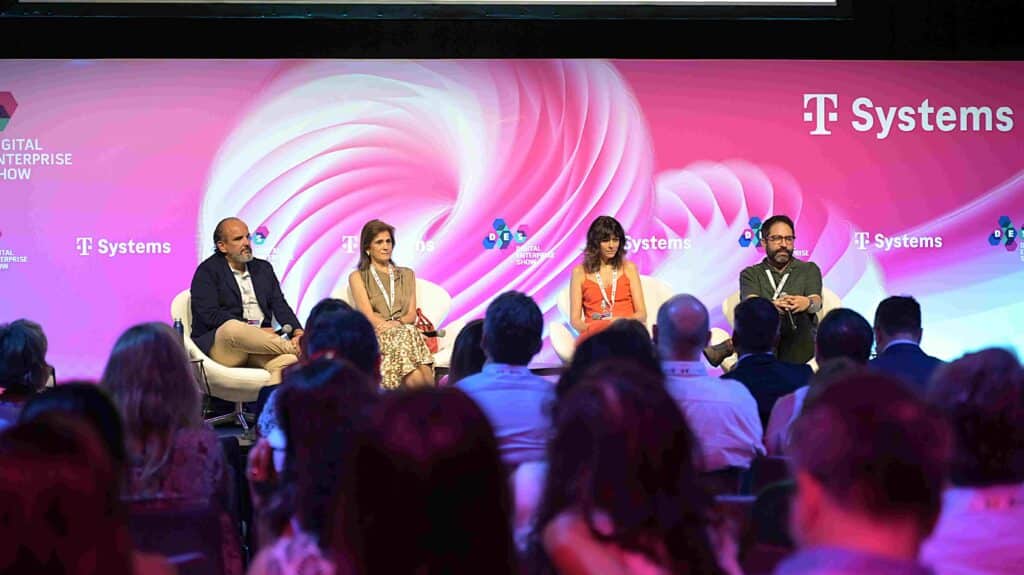The rapid adoption of artificial intelligence (AI) and other emerging technologies in the business sector faces a critical barrier: the lack of qualified professionals. This was emphasized by Lucía Flecha, director of the Digital Transformation and CIIO Office at Ferrovial, during her speech at the DES – Digital Enterprise Show 2025, the largest European event on exponential technologies and AI, held in Málaga.
Flecha made it clear: “There are over 4,000 positions related to AI and data unfilled in Spain. We expect this year to see a 15% increase in their occupation.” The executive warned of the urgent need to equip companies with prepared staff in an environment marked by high turnover and global competition for talent. According to her data, the average tenure in positions is around two and a half years, which leads to instability and loss of key knowledge.
Among the most difficult profiles to find, Flecha highlighted those specialized in computer vision and noted that, although profiles linked to governance are progressing, they remain scarce. She also stressed the impact that generative AI will have on the transformation of work: “Virtual agents that employees can create themselves are beginning to arrive. It will be essential for them to receive appropriate training and know how to govern them, as they will completely change the way we work.”
For her part, Rosa Montero, Human Business Partner Digital at Airbus, emphasized the importance of fostering intergenerational collaboration within companies. “We coexist with four generations in the company, and it is essential to have a real exchange of knowledge between senior and junior profiles,” she noted.
Montero also agreed with Flecha on the need to strengthen collaboration between companies and educational entities to reduce the digital talent gap. “The company-training binomial must be constant and strategic. It is not enough to provide training; we must integrate profiles from the outset by designing joint projects and establishing ongoing dialogue,” she concluded.
Both executives concurred that the success of digital transformation inevitably relies on investing in talent, continuous training, and sustained partnerships between academia and industry, especially in a context where AI and its applications are redefining the future of work.
### The Role of Universities: Integrating AI with a Humanist Approach
Representatives from various academic institutions gathered at DES2025 to explore the leadership technology is achieving in education, as well as to highlight the incorporation of a more humanistic vision. In this regard, Francisco García, emeritus professor at the Complutense University of Madrid, stated that AI “is not just about helping to improve the transfer of knowledge between industry and academia; it has to do so.” The specialist advocated for dialogue between companies, institutions, and universities. “AI can help us because it will not just interact, but interact and enrich perspectives.”
For his part, Juan Salvador Victoria, Associate Dean of Research and Transfer at the Faculty of Communication Sciences at the University of Málaga, advocated for multidisciplinary approaches as the necessary focus for researching in and with AI. “This technology itself is not relevant; rather it leads us to reconstruct and recognize human intelligence,” he explained. The speaker proposed launching a transversal approach, where beyond including AI and its management in curricula, “we would incorporate the subject of human intelligence,” he assured.
Meanwhile, Bella Palomo, Dean of the Faculty of Communication Sciences at the University of Málaga, expressed concern about the risks arising from the inappropriate use of machine learning tools. “Digital natives are not immune to the dangers posed by new technologies because they have not received specialized training in them. We are worried that this great digital success could end up transforming into a social failure.” In this context, she considered faculties, companies, and schools important for raising awareness. “We are creating an automatic data exchange tool to automate misinformation, but we are aware that there is a margin for error,” she clarified.
### The Evolution of Organizational Culture
DES2025 also examined new models for attracting and retaining professionals. “We are facing a paradigm shift. The process has evolved so that the company no longer just wants to fill vacancies but to create an attractive ecosystem for future employees,” indicated Vanessa Izquierdo, General Director of Sagardoy Business & Law School. Elisa López, an expert consultant in talent identification and development, agreed, stating that “the most effective way to reach tech profiles is through word of mouth, that recommendation from someone who says it’s great to work here.”
For her part, Paloma Arias-Perero, Senior Director of People & Culture at Four Seasons Hotels and Resorts, defended the interrelation with future employees by maintaining a network of contact with schools. “What attracts the most is what the company can offer me, growth opportunities, and that needs to be sold,” she detailed.
The experts considered it crucial to change organizational culture, especially in a market where young digital professionals converge with senior specialists. “Companies are rethinking their organizational model. We talk about labor tourism; we can no longer expect someone to stay for life, but they need to feel part of a structure. Therefore, corporate identity must be carefully designed to meet the interests of those generations,” Izquierdo highlighted.
López similarly emphasized the priority of addressing the demands of Generation Z. “They don’t want to be middle managers. It’s not that they don’t want to lead; they seek collaborative and adaptable environments. We must realize that a crisis may soon arise in these positions and in succession plans,” she concluded.

